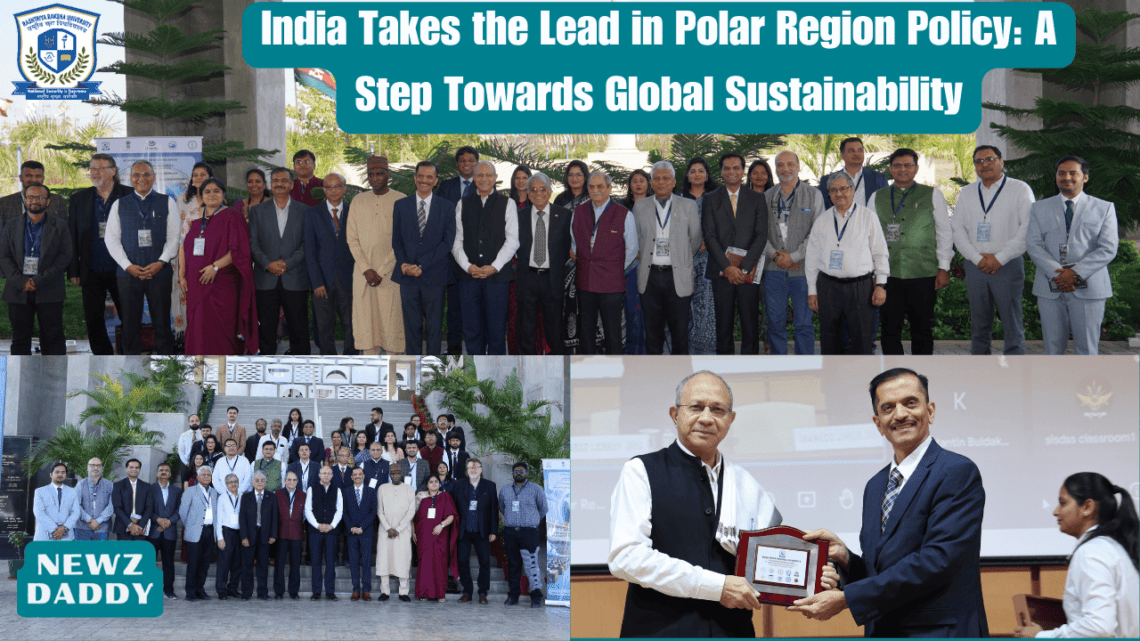India Takes the Lead in Polar Region Policy: A Step Towards Global Sustainability
Newzdaddy Education Updates
India’s Polar Policies: Navigating Towards Sustainability
On the 12th and 13th of March 2024, Rashtriya Raksha University held a groundbreaking event – India’s First International Workshop on Polar Region Policy. This workshop, organized by the School of Integrated Coastal and Maritime Security Studies (SICMSS) in collaboration with the Ministry of Earth Sciences (MoES), the National Centre for Polar and Ocean Research (NCPOR), and the University of the Arctic (UArctic) Network, aimed to bring together experts, scientists, policymakers, and researchers to discuss India’s approach to the polar regions.
Key Participants and Guests,
The event saw the participation of esteemed guests including Ambassador Pankaj Saran, Rear Admiral TVN Prasanna, and over 150 attendees from various sectors including diplomats, scientists, and educational institutions. These individuals came together to exchange views, share research findings, and discuss best practices concerning the polar regions.
India’s Commitment to Environmental Protection
Professor (Dr.) Bimal N. Patel, the Vice Chancellor of Rashtriya Raksha University, highlighted India’s dedication to environmental protection, scientific research, and international cooperation in the polar regions. He emphasized India’s recent initiatives such as signing a Free Trade Agreement with the European Free Trade Association (EFTA), which is expected to attract significant investments and open new opportunities for Indian industries.
Legal Framework and Policy Initiatives
Dr. Patel shed light on key legislative measures including “The Indian Antarctic Act, 2022” and “The India’s Arctic Policy, 2021”, which outline India’s vision and mandate concerning the polar regions. He also underscored India’s active participation in international organizations like the Antarctic Treaty System (ATS) and the Arctic Council, demonstrating its commitment to promoting peace and stability in these regions.
Must Read:
Partnership for Education and Training: Rashtriya Raksha University and Assam Rifles Collaborate
Achievements and Collaborations
The Vice-Chancellor highlighted the remarkable achievements of Indian scientists and researchers in the polar regions, facilitated by strategic initiatives, collaborations at regional, national, and international levels, technological advancements, and policy-making efforts supported by the Ministry of Earth Sciences (MoES) and the National Centre for Polar and Ocean Research (NCPOR).
Distinguished Guest Remarks
Rear Admiral TVN Prasanna commended Rashtriya Raksha University for its leadership in polar region policy, particularly its involvement in drafting key legislations such as “The Indian Antarctic Act, 2022” and “The Arctic Policy, 2022”. He also highlighted India’s maritime initiatives and the upcoming Antarctic Treaty Consultative Meeting – 46 scheduled for May 2024 in Kochi, as significant developments in polar policies.
Chief Guest’s Perspective
Ambassador Pankaj Saran praised the efforts of Rashtriya Raksha University and the Indian Government in establishing a National Security-oriented University committed to serving both military forces and civilians. He emphasized India’s historical connection with the polar regions and its active engagement as a member of the ATS and Arctic Council. Ambassador Saran stressed the importance of addressing climate change and promoting economic growth alongside capacity building for future generations.
Initiatives by SICMSS
Mr. Manish Singh highlighted the pioneering efforts of the School of Integrated Coastal and Maritime Security Studies (SICMSS) at Rashtriya Raksha University. SICMSS aims to raise awareness about polar legal frameworks, enforcement mechanisms, and associated complexities through research, education, and training initiatives in collaboration with national training agencies and international partners.
Must Read:
Puducherry Police and Rashtriya Raksha University Join Forces for Mission Karmayogi




